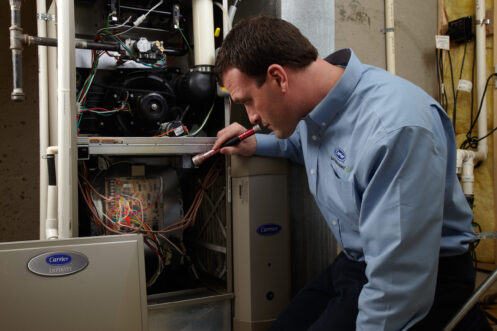
In both warm and cold weather, HVAC systems are in danger of freezing. Whether due to adverse conditions or insufficient maintenance, this is an HVAC issue that could lead to equipment failure if left unchecked. Worse still, when furnaces, heat pumps, and air conditioners ice over, residents of Festus, MO face the ravages of temperature extremes. The following are several common causes of HVAC freezing along with tips for resolving them.
Dirty Coils
In cooling mode, heat pumps and air conditioners use heat transfer to cool building interiors down. Warm air is extracted from indoors, passed over their refrigerant-filled coils, and then routed back inside after its heat has been absorbed. When heat pump and AC evaporator coils are dirty, this heat transfer never occurs. This in turn causes evaporator coils to ice over and heat pumps and ACs to shut down. The best way to keep this problem at bay is by having your air conditioner serviced annually or having your heat pump serviced twice each year.
Freezing due to dirty coils is a year-round risk for heat pumps that are used for both air conditioning and heating. Scheduling service twice each year gives HVAC technicians the chance to clean these all-important components before winter arrives and again before the summer season.
Dirty HVAC Air Filters
Airflow obstructions lie at the heart of many common HVAC issues. Moreover, most airflow obstructions occur at the HVAC air filter. Heaters and air conditioners draw air in and through these components. When filters develop thick, mat-like accumulations of hair, dust, carpet fibers, and other particulates, airflow declines and HVAC systems have to work harder. In heat pumps and air conditioners, excess work and delayed heat transfer cause icing at the evaporator coil. In furnaces, airflow issues and related rises in humidity can lead to problems at the condensate drain.
Dirty Condensate Drain Lines
Given that they’re filled with frosty refrigerant, it’s not surprising that heaters and air conditioners can freeze up. However, during the coldest weeks of winter, furnaces are at risk of freezing over as well. This is especially true when homeowners skip annual furnace maintenance.
After sitting dormant for many months, furnaces sometimes develop algal blooms, mold, or other growths throughout their condensate lines and condensate drains. If these features are never professionally cleaned, algae, fungi, and bacteria could inhibit the movement of water. Over time, frosty temperatures will cause this trapped moisture to freeze. This could lead to short cycling or the complete shutdown of your heating system.
Blower Fan Problems
In HVAC equipment that relies on refrigerant for heat transfer, keeping air and refrigerant moving is vital for avoiding problems like overheating, short cycling, and freezing. The blower fan is what drives air throughout your HVAC system. You might have a broken or failing blower fan if:
- You hear screeching or squealing when your HVAC system is on
- The blower fan won’t work at certain operating speeds
- There’s little to no air coming from your HVAC air vents
- Your HVAC system won’t turn on
- Your home energy bills are on the rise
Blower motor problems may be the result of wiring issues or other electrical troubles. If you suspect your blower motor is malfunctioning, it’s best to turn your HVAC system off and schedule service.
Signs Your HVAC System Is Freezing and What to Do
In most instances, freezing HVAC systems have visible build-ups of ice on one or more of their components. As icing becomes an increasing issue, airflow declines, and less air is released from HVAC air vents. Furnaces, heat pumps, and air conditioners start running increasingly shorter cycles until they’re no longer able to turn on at all.
The first thing to check is your air filter. When you hold this component up to the light, you should be able to see light through it. If light is unable to pass through filter debris, air will also have a hard time moving through it.
If you’ve checked your filter and know that this isn’t the problem, check your furnace or AC condensate line as well. Build-ups of algae, bacteria, and mold are often smelly. There may even be small pools of water just around this feature or standing water in the condensate drain pan. The best way to keep this and all other possible causes of freezing from spiraling out of control is by scheduling HVAC maintenance or repair services right away.
Since 1978, we’ve been proudly serving Festus, MO and the surrounding communities. We offer heater and air conditioner maintenance, installation, and repair services. You can also turn to us for fireplaces, water heaters, ductless mini-splits, and preventative maintenance plans. Get in touch with Bone Heating & Cooling today to schedule an appointment.

